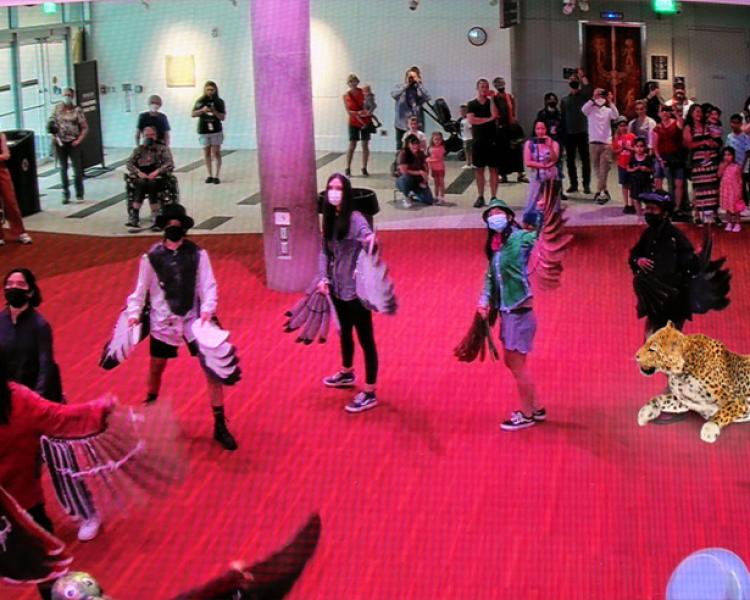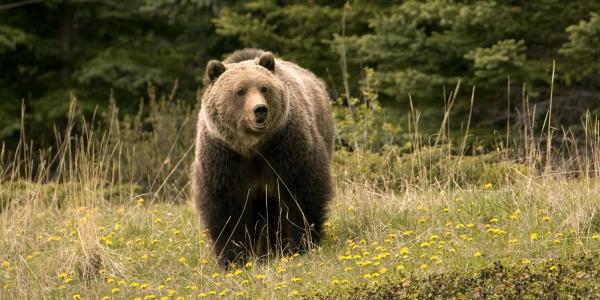The award will fund small exhibits created by high school students that will tour museums and birding festivals throughout the Americas, raising awareness about climate change and promoting STEM diversity
Can the common barn swallow help promote awareness of climate change while encouraging greater diversity in STEM?
A group of University of Colorado Boulder faculty believes so—and they recently won a five-year grant worth nearly $2 million from the National Science Foundation (NSF) to fund their endeavor.
Their project aims to recruit high school students from Denver area schools to create small, touring art-science exhibits centered around humanity’s relationship with birds. A primary goal is to instill a deeper connection with the natural worldin today’s youth.
Through hands-on exploration, students will better understand of how bird biology intersects with changing local environments and a shifting climate, the group notes.

A cross-disciplinary team of CU Boulder faculty members recently won a five-year, nearly $2 million grant from the National Science Foundation designed to promote awareness of climate change while encouraging greater diversity in STEM. Those team members (from left to right) are: Rebecca Safran, professor of ecology and evolutionary biology and environmental studies; Shawhin Roudbari, associate professor of environmental design; Beth Osnes, professor of theater and environmental studies; and Chelsea Hackett, educational theater researcher, facilitator and professor. The faculty members are pictured with a giant bird puppet, reflecting their project’s focus on migratory birds and climate change. Photos at the top of the page and above by Kylie Clarke.
Securing the competitive NSF Advancing Informal STEM Learning (AISL) grant was rewarding for the team, “especially given that this was our first submission to this highly competitive funding program,” says Rebecca Safran, professor of ecology and evolutionary biology and environmental studies whose lab studies barn swallows.
“Once we got word that we received funding, our mood was very celebratory,” she adds. “We are all very passionate about this project and ready to get started on the work.”
Fortunately for the CU team, they had advantages in the grant-selection process. One was that team members had already been successfully overseeing the Side by Side art-science program in Boulder for local high school students for the past three years. That program—which was previously funded by local sources including the CU Research and Innovation Office, the Center for Humanities and the Arts, and supplements to Safran’s existing NSF grant—is a template for the NSF-funded endeavor.
A second factor is the corresponding expertise of those CU team members, which also includes Beth Osnes, professor of theater and environmental studies; Chelsea Hackett, educational theater researcher, facilitator and professor; and Shawhin Roudbari, associate professor of environmental design. Moreover, former PhD student Molly McDermott and honors student Avani Fachon collaborated with the team by collecting data and designing material and visuals for the project, many of which were included in the grant document.
“We all have our areas of expertise,” Hackett explains. “Beth and I often publish in education and theater journals, Becca is our expert in evolutionary biology and has been teaching a class in science communication for the past 14 years, and Shawhin is an expert in environmental design.”
The four faculty members are comfortable working across disciplines. Osnes and Safran are two of the founders of Inside the Greenhouse, which uses film, fine art and performance art to address climate change; and Roudbari, Safran and Osnes all assisted in founding the Center for Creative Climate Communication and Behavior Change (C3BC). Additionally, Hackett and Osnes co-founded SPEAK, a nonprofit supporting young women in self and civic advocacy.
Building on Side by Side’s Success
In the program, high school students from historically under-represented communities in the Denver metro area will participate in 10-day summer-intensive programs at CU Boulder. Under the guidance of undergraduate near-peer mentors from the Miramontes Arts and Science Program (MASP), as well as a small group of graduate students and scientists, the participants will delve into the world of migratory birds, particularly barn swallows, which have nesting grounds around campus. Barn swallows are notable because they make their homes in human-built structures, so their fate is tied with that of humans, Safran says.
During the summer program, high school students will learn through art-science observation of wild bird populations, data collection and focus group discussions. The program will partner with Garth Spellman, curator of birds at the Denver Museum of Nature and Science and the education team at the Bird Conservancy of the Rockies.
With that STEM-focused knowledge, they will create Migratory Micro-Exhibits (MMEs) that feature materials including wearable bird costumes, art-science explorations of bird biology and bilingual (English/Spanish) interactive components designed to engage audiences about the changing climate.

The nearly $2 million NSF grant will provide continued funding for the Side by Side program at CU Boulder, which involves high school students creating small, touring art-science exhibits centered around humanity’s relationship with birds.
Under Roudbari’s guidance, program participants will design and build the exhibits as migrating trunks, which will be shared with K-4th graders in partnership with Growing Scientists, a collaboration between Denver art and science organizations including the Bird Conservancy of the Rockies and the Denver Botanic Gardens.
From there, the trunks will be distributed widely through partnerships with the Denver Museum of Nature and Science and the Environment for the Americas. Program organizers anticipate that the trunks will travel across the Americas, from Canada to Central and South America.
Given how extensively the trunks are expected to travel, it’s vital that they be sturdy and yet look like they belong in professional settings, according to Osnes.
“That’s a big task for Shawhin and his students: How do we construct these so they can survive trips across the Americas? And how do we design them so that they can take the spirit this project embodies and make it accessible to an end user who is seeing it in a museum or a botanic garden or a professional art and exhibit space?” she says.
Safran says the traveling exhibits will be designed to help both the youth creators and the young audiences perceive how changing local habitats are part of larger, global phenomena like migration and climate change.
“We will have students observe wild bird populations that breed here in Colorado during the summer that will migrate along with the exhibits to our partner organizations where these same bird populations can be observed during the non-breeding season,” she says.
The NSF-funded program officially kicks off in the fall semester. About 10 to 12 Denver high school students will participate. Students will be selected, in part, by their involvement and interest in biology, natural sciences and art, Hackett says.
The program will select a new group of Denver high school students for each year of the program, and each year about five to 10 MASP undergraduate students will serve as near-peer mentors to the high school students.
During the program’s five-year life, organizers anticipate that thousands of K-4th grade students will be exposed to the high school student-created exhibits, Hackett says.
Safran says after the first NSF-funded Side by Side summer program concludes, she and her teammates, including graduate students in ecology and evolutionary biology and theatre and dance, will study what parts of the program were successful and what might benefit from changes, with improvements later incorporated into the program.
Promoting Diversity in STEM
This project specifically emphasizes involving underrepresented groups in STEM, Hackett says, working closely with Latinx female-identifying youth and those who do not conform to traditional gender roles, with the aim of addressing the lack of climate change communications intended for minority audiences.
“They (NSF) had just made this shift where they really want to see people making strides toward changing what STEM looks like in terms of diversity and representation,” she says. “And you can’t just do that by having diverse students at the end. You have to be thinking about it throughout the process. And I think that worked to our benefit in getting the grant, because we’ve been doing that for the past few years. That’s kind of the heart and soul of this program.”
What’s more, MASP undergraduate students who will work with the high schoolers are from groups that are traditionally underrepresented in higher-education and/or are first-generation college students, she adds.
“The notes (from NSF) for our grant just kept saying, ‘We love that the peer-to-near-peer mentorships are diverse, and who are not the typical students, and who are able to model for young people that science and the arts should be welcoming to everyone,” Osnes says. “And not only welcoming, but benefiting from everyone’s inclusion, because the more perspectives we have to solve climate change, the better able we’re going to be to do it.”

Part of the Side by Side program involves having students creating bird costumes, which they display for family members and others at the end of their summer program.
Meanwhile, the Side by Side leadership team has diverse training and skills, according to Safran.
“One of the cornerstone dimensions is really represented in the leadership team, which is composed of artists and scientists and environmental designers,” she says. “That kind of interdisciplinary, inclusive work takes time. It’s a real commitment by all the parties; it doesn’t just happen.”
Hackett says one of the things that most excites her about the program is that the elementary school students who view the trunk exhibits will learn that the creators of the exhibits are like them, which can open up worlds of possibilities to those young minds as they contemplate their careers.
“What does it say to a fourth grader or a fifth grader when they see someone who is only a few years older than them presented as an expert, telling them stories about birds and climate change?” she asks rhetorically.
“The ultimate goal is that those young students who are going to be experiencing the trunks … are going to be able to see a pathway into STEM fields that not only feels accessible but also is filled with people who are like them and is also a welcoming and experiential space.”
Did you enjoy this article? Subcribe to our newsletter. Passionate about ecology and evolutionary biology? Show your support.



